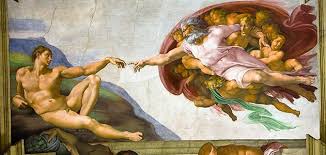GOD EXISTS
The moral argument says:
1. If God does not exist, objective moral values and duties do not exist.
2. Objective moral values and duties exist.
Conclusion: Therefore, God exists.
In our previous blog posts on the moral argument, we believe we’ve adequately refuted the two primary arguments that are used most often against premise 1 in the world today:
• Naturalism’s argument that morals don’t exist and are just an illusion, something concocted by cultures for survival purposes, but not real.
• Atheistic moral platonism’s position that objective moral values do exist, but independent of any God.
We also provided a refutation of the two primary arguments against premise 2:
• Moral relativism’s assertion that objective moral values do not exist, that all morality is subjective – subject to cultural and individual opinion.
• Socio-biological evolution’s argument that we can attribute our morality to a struggle for survival, and therefore it is not objectively true.
If these are the most significant arguments against premises 1 and 2 in the world today, it appears more likely than not that both premises are true.
The only question left would be, “Does the conclusion logically follow from the two premises?” It does logically follow.

CONCLUSION
The best explanation for the moral sense that we find in humanity is God. Therefore, the moral argument is true and God exists. That concludes our first evidence for the existence of God.
Logic requires that where there are independent arguments (that don’t rely on one another for their justification) all making the same point, we must consider the cumulative impact of all the arguments combined. So please read the arguments for God’s existence that are based on a beginning of the universe and the fine-tuning of the universe as well.
___________________________________________________________________________
THE EUTHYPHRO DILEMMA
Now, there is one more issue that is sometimes raised by our atheist friends. It’s called the Euthyphro Dilemma. In his Dialogues, Plato used a fictional character called Euthyphro to ask a question:
1. Is something good because GOD WILLS IT?, or
2. Does God will it because IT IS GOOD?
If you say “yes” to number 1, that makes morality arbitrary. That means that God could have made any actions good or bad according to his arbitrary will (e.g., saying murder and rape are good).
If you say “yes” to number 2, then morality exists entirely independent of God and he must be subservient to that morality.
Are we really forced to choose one of the two horns of this dilemma?
• Must we decide that morality is arbitrary and God could call anything good?
• Must we conclude that morality exists independent of God and he must be subservient to it (i.e., conform his actions to it)?
MORALITY FLOWS FROM THE NATURE OF GOD
No, Plato’s Euthyphro character is wrong in suggesting that these are the only two choices. There is a third possibility:
God wills something because HE IS GOOD.
This means that:
1. “God’s own nature” is the standard of goodness, and
2. His commands are expressions of his own moral character.
Our moral values (no. 1 above) and duties (no. 2 above) find their source in a just and loving God.
Since moral values flow from the nature of God who is just and loving:
• Moral values are not independent of God because his own nature or character defines what is good.
• Secondly, a morality that reflects God’s nature could not be arbitrary but is consistent with God’s character.
It’s possible for atheism to pose similar “false dilemmas.” For example, an atheist could ask the question, “If God commanded that we should all murder our children, would we be morally obligated to do so?”
This is a logically incoherent question and similar to asking “If there were a square circle, would its area be computed by squaring its sides?” There is no such thing as a square circle.
In like manner, the Euthyphro dilemma is a false choice based on faulty assumptions.
Morality is determined by, and naturally flows from, God’s own nature.

